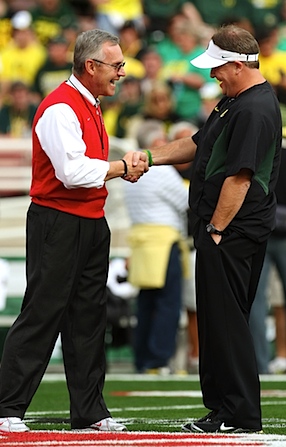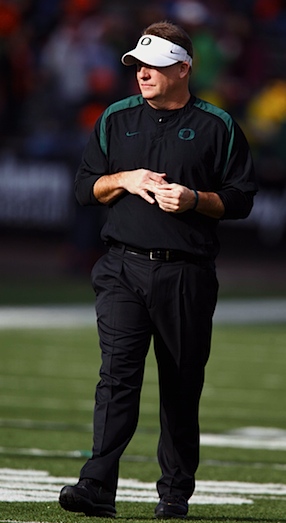 When Jim Tressel and Chip Kelly shook hands in the Rose Bowl on Jan. 1, 2010, it was a meeting of minds as far apart as two minds in the same profession can possibly be. One was an entrenched icon after a decade at one of the most venerable programs in college football, the other an up-and-comer at the vanguard of the sport's nouveau riche. One committed to conservative, inside-the-box orthodoxy, the other committed to pushing his innovative system to a new land speed record. One so cautious with his words he earned the nickname "Senator," the other perfectly willing to air his grievances on national television. One so bland he became synonymous with the most boring fashion statement on earth, the other the master of an endless variety of the most infamous ensembles in the country, who once surprised fans dressed as the mascot on the morning of the biggest game of the season.
When Jim Tressel and Chip Kelly shook hands in the Rose Bowl on Jan. 1, 2010, it was a meeting of minds as far apart as two minds in the same profession can possibly be. One was an entrenched icon after a decade at one of the most venerable programs in college football, the other an up-and-comer at the vanguard of the sport's nouveau riche. One committed to conservative, inside-the-box orthodoxy, the other committed to pushing his innovative system to a new land speed record. One so cautious with his words he earned the nickname "Senator," the other perfectly willing to air his grievances on national television. One so bland he became synonymous with the most boring fashion statement on earth, the other the master of an endless variety of the most infamous ensembles in the country, who once surprised fans dressed as the mascot on the morning of the biggest game of the season.
As of last Friday, though, minor chords began sounding in Oregon because of what Kelly and Tressel now have in common: If a willful coverup of NCAA violations can fully submerge the career of a coach as respected and deep-seated as Jim Tressel in a matter of months, how long can Kelly ? just two years into a tenure that's been as persistently rocky off the field as it's been successful on it ?�possibly survive now that his alleged middleman to Texas recruits has wised up and ratted him out?
It's a different question today than it would have been a few weeks ago. Make no mistake: Tressel's rapid demise at Ohio State, along basketball coach Bruce Pearl's similarly inglorious exit at Tennessee, both put Kelly in a more damning spot than he would have faced if either man still had his job. If, as Willie Lyles claims, Kelly did pay $25,000 for Lyles' "access and influence with recruits" under the guise of buying laughably bogus scouting reports on potential prospects who were already long out of high school, the precedent is clear: Covering up a major NCAA violation is a capital offense. Yes, in fact, prominent coaches do lose their jobs over this sort of thing.
Even if they're winners. Even if they were considered virtually untouchable right up to the second Yahoo! Sports broke the claims against them. Even if the hometown fans still have their backs. Even if they're widely assumed to be too safe to fire without an obvious regression on the field.
By and large, Ohio State fans hung by him all the way to the end, too. A lot of them still are. The athletic director stood by his coach, and the highest-paid public university president in the nation joked about hoping Tressel didn't fire him. In the end, once the magnitude of the official charges against Tressel was clear ?�and it became equally clear that the university's best hope of avoiding crippling, USC-level sanctions was to sweep Tressel out in the name of cleaning house ?�nothing mattered except minimizing the damage.
 Tressel may not be the last man to fall on his sword for Ohio State, and if the NCAA forces Oregon into the same corner over its payment to Lyles, he may not be the last "untouchable" coach to go down in flames by year's end. His fall was proof that there is no such thing as "too safe to fire": If "the Senator" can fall for intentionally manipulating the rules, any other coach must fall.
Tressel may not be the last man to fall on his sword for Ohio State, and if the NCAA forces Oregon into the same corner over its payment to Lyles, he may not be the last "untouchable" coach to go down in flames by year's end. His fall was proof that there is no such thing as "too safe to fire": If "the Senator" can fall for intentionally manipulating the rules, any other coach must fall.
What Kelly has for the moment that Tressel did not is a shred of plausible deniability. Ohio State, playing along with the NCAA's emphasis on transparency and institutional initiative, voluntarily provided the prosecution with�both a solid paper trail and a public admission of guilt that Tressel knew about specific, credible allegations of violations by his players long before they were brought to the attention of anyone else at the university.�There is no such certainty yet at Oregon. True, the $25,000 payment to Lyles isn't in question; neither is his extensive contact with Kelly and other Oregon coaches. But their motives may be. If, in spite of Lyles' story and all other appearances, Oregon can convince investigators that it really did think it was paying for a legitimate scouting report from a legitimate scouting service, the NCAA may be forced to soften its attack. If not enough to let the Ducks escape scot-free, at least to the extent that Kelly is able to avoid a show-cause penalty or other sanctions under the killer bylaw. After all, it does ultimately come down to "He said/He said."
Based on what we know right now, though ? namely, that Lyles a) Had close contact with current Oregon players when they were coveted recruits, b) Was paid $25,000 by Oregon, and c) Has a much more plausible explanation for the shallow, obsolete rush job he sent Kelly more than a year after the payment ?�Lyles' version of events is more than compelling enough to get university lawyers reviewing Kelly's contract in search of a way out. The NCAA's willingness siding with potentially shady accusers is fairly well established. If it chooses to believe Lyles, Kelly will have only the regular season and his bosses' mercy between him and the same sad fate.
- - -
Matt Hinton is on Twitter: Follow him @DrSaturday.
Rebecca Romijn Nadine Velazquez Pink Mila Kunis Samaire Armstrong
No comments:
Post a Comment